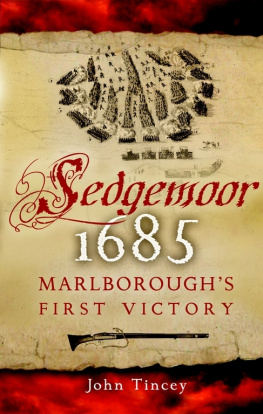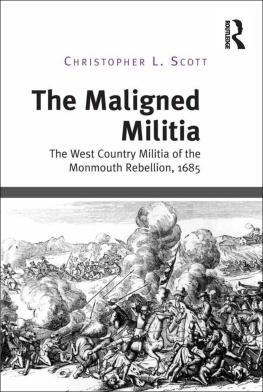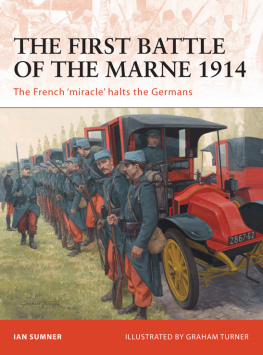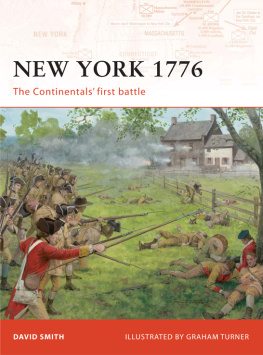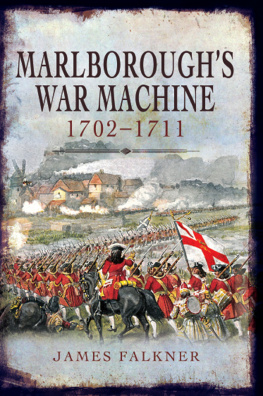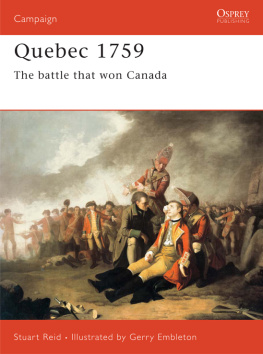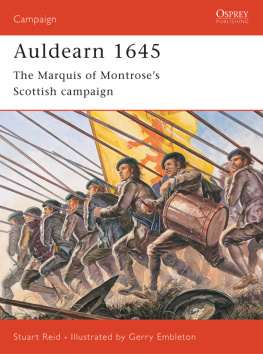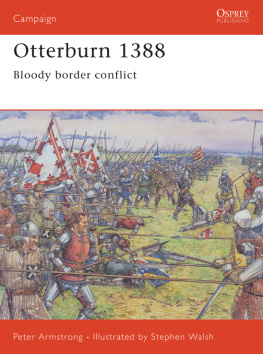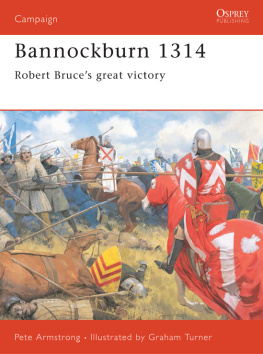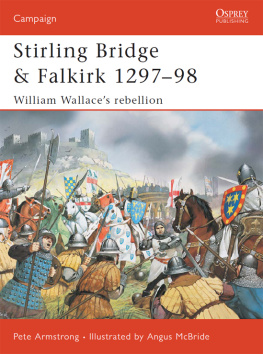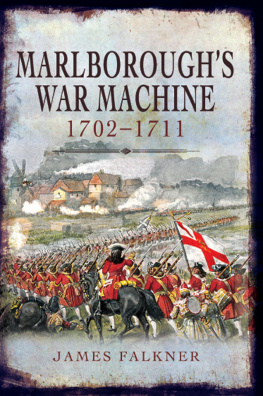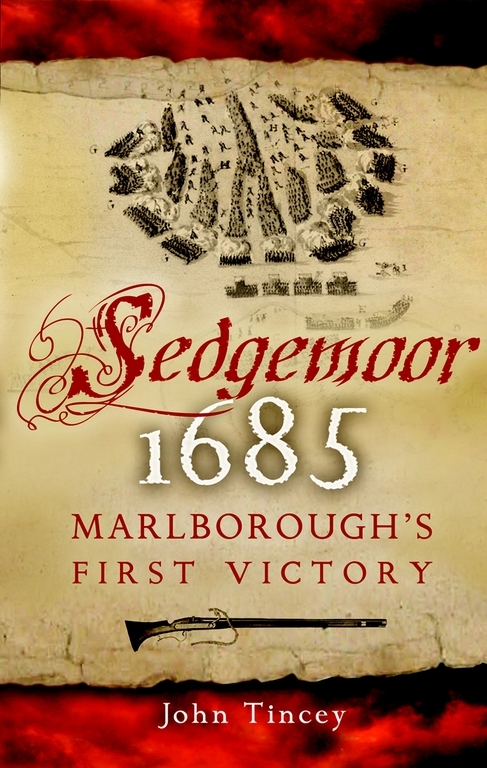For their assistance, in discovering and providing documents and illustrations used in this book, thanks are due to the staff of the National Library of Scotland, The Pepys Library, The British Library, The National Portrait Gallery and the National Monuments Record. My particular thanks are due to Mr Stopford Sackville for permission to reproduce items from the Drayton Archive.
I must also thank Keith Roberts for many years of advice on seventeenth-century military drill, Derek Stone for his evocative maps and Dr Tony Pollard for discussions on his archaeological work carried out on the battlefieldalthough we disagree on the possible interpretations, we are of one mind that the current survey of the site will yield more surprises.
Most of all my thanks go to my wife Gail, for her patience during the long months occupied by the writing of this book and for her help and support in editing my draft into readable English. Twenty years have passed since Gail corrected the text of my first book on the Sedgemoor Campaign, and I hope to have mastered the use of the apostrophe before the next twenty years have passed.
Appendices
Appendix One: Andrew Paschalls letter
[covering page]
[Add Mss] 30,277.
Bequeathed by Rev. Thomas Hugo 10 March 1877
[reverse of page 1]
To my worthy honed friend
Robert Nelson Esq
At his house in St Jameses street over against
Parke place those
Present
at
London
[page 1]
S[i]r
The inclosed is in performance of my promise, I wish I could have procured a more skilfull hand, that it might have been more worthy of your acceptance. But as it is, I hope it may not be unusefull in recalling into your remembrance what you saw. I have met two or three informations since I had the favour of your company here: They may not be altogether unworthy of Notice. One I have inserted into the Narrat[ive] [and] the others are as follow. 1. That when on Wednesday July 1 The D. of M. incamped (as I suppose in Pedwell plaine (A pla[ce] in [the] upper part of Kings Sedgmoor to which he came from Glastonbury) The Taunton men, fearing he would march for Taunton, requested of him not to go thither, for that a siege would undoe them, they having suffered very much already [marginal note] The D. of M. to have replyed that they had done well not to have sent for him so earnestly to come to them from Lime] There & that evening A Smith of Taunton, a souldier of the Dukes, brought a copy of His M[ajesties] Proclamation of pardon among the common souldiers. Next morning the Army being called over they found wanting a 1000 men. The D asking after the reason & hearing what that Smith (I thinke his name was Dyer) had done. There was a party sent after him [come?] home to take him up. On Sunday morning before the fight he was brought to Bridgwater, & was bid to prepare for death and so believes he had been hanged had he not been cleared from them by the fight to which he was carried among the other prisoners2. That the Sunday night before the fight one of Weston was by the Tything-man pressed to go a guide next morning. When the fight began this Tything-man sought him out and brought him to a great lord whom he names not. The guide threatened with present death if he offered to stir from them. He led them (the Ld. and his retinue) from the churchward through a lane that leads to that place where you saw the waggons & guns that stood within the lower plungeon. The bullets came pretty thick about them they he sayth came near Col. Kirks Tents and then back[e]d among the waggons and here the bullet flew, and made more noise as striking against the wainscot of the carriages. The Ld asked the guide where he might go to be safe the guide answered he knew no where but by going back into the town The Ld replthed, No! that must not be. They then went again toward that corner where Col. Ks regiment stood, when they heard one crying aloud, they run, they run; On this the Lord and his Company speeded into the Army The guide soon lost them and shifted for himself. 3. That besides the 500 Horse lead first, & which are presumed to miss their way, the D. of M. had 300 Horse placed under Sutton Mill viz the part of the moor next to it, those expected the issue of the battell, & when they saw their time shifted for them selves. Some of Sutton heard upon the first fireing (viz. against the 500 Horse), a great cryHold for the passion of God, if you be men. This was probably on the Skirmish the s[ai]d horse had with their own party on their retreating from the Kings Army. It is Sayd the Kings 300 Horse missing their way out of Weston to the Camp on the Alarm, went to pinzey, & thence comeing towd their camp were ingaged
[page 2]
in a like Adventure meeting with friends they supposed them to be enemys & treated them so. 4. That the D. of M. had but 4000 of his foot Army that came into the field. The pistol & Alarm hastened the front The Narrownes of the lanes they marched through Hinderd & retarded the Rear & the obstinate retireing of the 500 Horse, meeting them at a distance, & telling them the day was lost, these were I suppose the cause why these came not up. Of that 4000, it is sayd there were but 2000 Actuall ingaged. The other 2000, Among whom were the Scythe-men, stayd (as near as I can learne from the relation of one of those scythe-men, who himself was there) about that part of Langmoor which you see, in the inclosed paper, noted by the figures (2000) in a parenthesis. But S[i]r tis time to beg your pardon. The habit of inquisitivenes which I have gotten into the even minute particularitthes of this important Action, that happend so near my dwelling, hath made me I fear impertinent. When I shall have opportunity to see my lord, w[hi]ch I hope will be shortly, I shall gratefully acknowledge the favour he showed me in making me known to so worthy a person as your selfe. My relatives join with me in sending of our humble services to you. And I am with very sincere & great respect
July 24 1686
S[i]r
Y[our] very faithfull & humble ser[vant]
S[i]r your commands directed to mr beer, to be left at your posthouse in Bridgwater will I doubt not come to my hand & I shall receive them as an obligation. I must intrust you to remember how the inclosed hath been disposed for the Kings service.
Appendix Two: A True Relation
(1)
A True
RELATION
Of the late Action and Victory against the Rebels in England, near Bridgewater,
on Monday the 6. of July 1685, From several Hands.
The rebels having exact Notice how the Kings Army was Encamped, did on Monday 6th. Instant, about 2 a clock in the Morning, with extraordinary Silence, march towards it, with a Design to fall upon the Right Wing, where the five Companies of the Kings Royal Regiment of Foot, under the Earl of Dumbartouns Command, were posted, and were so near, that the Companies had scarce time to form their Battalion, when they were chargd very briskly by three of the Enemies Battalions, whose Fire they received very patiently, till they were advanced within 30 Paces of them ; then the Scots Fired upon them so Vigorously, that they made them reel ; but by the Instigation of their Commanders Rallied again. The Rebells had two pieces of Cannon playing with small Shot on the Camp all this while, which continued a large half hour, during which time, the five Companies maintained the Fight against all the Efforts of the Enemies, with the loss of a considerable number of men on both sides: At last the Dragoons came up to the Companies with one piece of Cannon, and the General on the Head of them, encouraging and desiring them to Charge the Rebels, which they performd so vigorously, that they beat them into the middle of the plain Field, where the Horse Guards and Oxfords Regiment of Horse charged their Cavalry. The Scots pursued the Rebels over a great many Ditches, killed a considerable number of them, took 300 Prisoners, the 2 piece of Cannon and 5 Colours for their own share, one of which is the Grand Rebels own Colours, with Motto in Gold Letters, Fear nothing but GOD, the first he Landed with in England, taken as it is reported, by Captain Robert Hacket. The Dragoons, and some of the Kings Battalions of Foot, took several other Colours, and a great many Prisoners. The Account of the Killed and Wounded follows.

